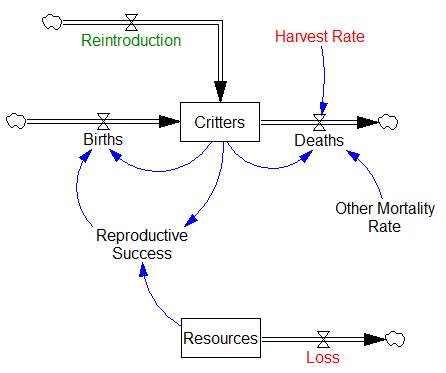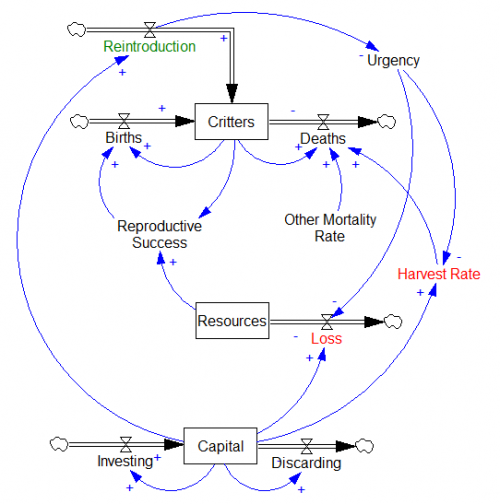I’ve seen a lot of attention lately to restoration of extinct species. It strikes me as a band-aid, not a solution.
Here’s the core of the system:
 Critters don’t go extinct for lack of human intervention. They go extinct because the balance of birth and death rates is unfavorable, so that population declines, and (stochastically) winks out.
Critters don’t go extinct for lack of human intervention. They go extinct because the balance of birth and death rates is unfavorable, so that population declines, and (stochastically) winks out.
That happens naturally of course, but anthropogenic extinctions are happening much faster than usual. The drivers (red) are direct harvest and loss of the resource base on which species rely. The resource base is largely habitat, but also other species and ecosystem services that are themselves harvested, poisoned by pollutants, etc.
Reintroducing lost species may be helpful in itself (who wouldn’t want to see millions of passenger pigeons?), but unless the basic drivers of overharvest and resource loss are addressed, species are reintroduced into an environment in which the net gain of births and deaths favors re-extinction. What’s the point of that?
If the drivers of extinction – ultimately population and capital growth plus bad management – were under control, we wouldn’t need much restoration. If they’re out of control, genetic restoration seems likely to be overwhelmed, or perhaps even to contribute to problems through parachuting cats side effects.


Can’t say it any more straightforwardly than that model. It would be interesting to extend it with habitat fragmentation; selective human removal of larger animals; and invasive introductions in depauperate ecosystems (i.e. almost everywhere on Earth).
More complicated to add would be the truncated ecological succession – how we clearcut, strip mine, and drag net so much of the world that Old Growth forests and other mature ecosystems are exceptionally scarce. The tropic pyramid is truncated, and the food chain is unlinked by the heavy footprint of humanity.